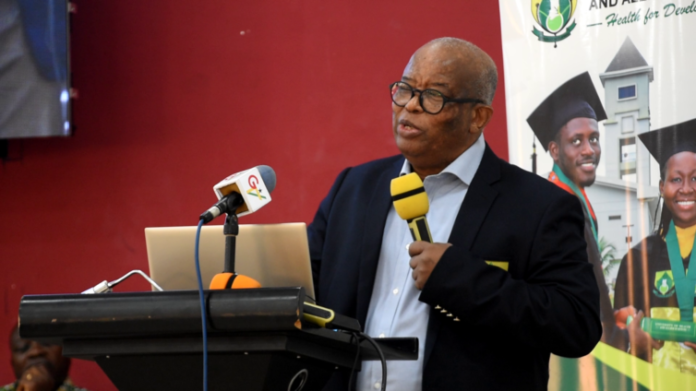A Professor of Epidemiology at the University of Health and Allied Science (UHAS), Professor Fred Newton Binka, has raised questions about the implementation of the government’s ambitious Agenda 111 policy as a measure to prepare for a pandemic.
According to him, the construction of 111 district health facilities is not feasible, indicating the projects would only increase the number of uncompleted government structures due to lack of funding.
He was speaking at the UHAS-SEND Ghana-Ghana Health Advocacy Incubator Symposium on public health emergency funding in Ho.
Prof. Binka lauded the idea to enhance universal health coverage in the county in preparation for a pandemic, but believes the approach of constructing 111 health facilities at a go, is a nonstarter.
“That’s a great idea, but why shouldn’t we just say okay, this year we will build 20, next year 20, till we get to 111? So far we haven’t built any, when is the first one going to finish?”, he quizzed.
He questioned how the health facilities would be equipped since no budgetary allocation has been made to that effect, adding that the exodus of health workers to Europe and America would affect the operation of the Agenda 111 facilities when completed.
He fears the government may not be able to raise the proposed $1 billion to complete the Agenda 111 projects, adding the International Monetary Fund (IMF), may as well truncate the project.
Prof Binka, therefore, suggested that the funding could have been channeled into equipping existing facilities or undertaking the projects in phases.
“We got a 100 million to start up Agenda 111. Look, sometimes I am not sure how these things work, but at the last count we were told that the Agenda 111 will cause almost a billion dollars. When you get 100 million, you don’t start to build 111, you have to phase it in.
“Now we have started 111 hospitals all over the place, have you got the 900 million? Now we are at IMF, if IMF comes and says ‘I am sorry you can’t be investing in capital expenditure when you can’t manage to pay the salaries of your workers or you can’t give textbooks to your school pupils’,” he said.
Prof Binka asserted that events during the peak of the COVID-19 pandemic depict that the leadership of the country’s health sector lacks expertise in the sector, and is hence unable to formulate effective policies and frameworks.
He suggested that to ensure the effective execution of a preparedness plan for a pandemic, Ghana must set up a Center for Disease Control, determine workforce development, establish laboratory systems, emergency response and operations, risk assessment and planning, risk communication, and a national legislation policy and financing framework.
In March 2022, President Akufo-Addo admitted for the first time that the timeline given by his government for the construction of all hospitals under the government’s Agenda 111 project, was overly ambitious.
The President, who said this in parliament on Wednesday, March 30, 2022, when he delivered the State of the Nation Address, said the projects will be completed before January 7, 2025.
“Agenda 111 is an ambitious project, which must and will be done, and which will create some 33,900 jobs for construction workers, and, on completion, some 34,300 jobs for health workers.”
“Mr. Speaker, I have to report that, like all major construction projects, it is evident that the initial schedule we gave for the completion of Agenda 111 was overly ambitious. Identifying suitable sites around the country, for example, has turned out to be even more problematic than had been anticipated. I am able to say that a great deal of the preparatory work has now been completed, and work has started at 87 of the 111 sites. I have been assured that preliminary work on the remaining 24 sites is ongoing,” he added.
About the project
The Agenda 111 project is part of a grand vision for Ghana’s healthcare sector by the Akufo-Addo administration.
The project will ensure that 101 outstanding districts will be provided with hospitals in addition to 10 selected regional and specialized hospitals.
The government has already set aside an amount of US$100 million as commencement funding for the project.
Each of the hospitals will cost $16.88 million, with $12.88 million being used for the construction of the hospitals and $4 million for medical equipment.

